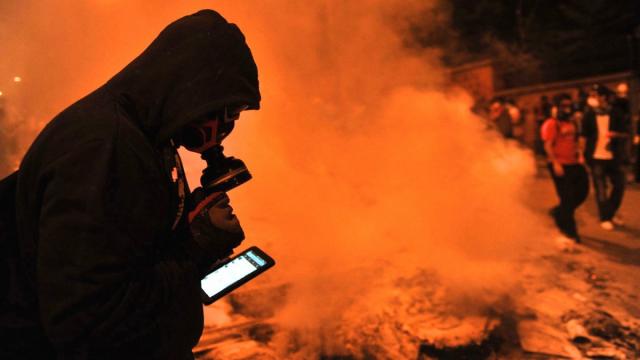
With major protests in the news again, we decided it's time to update our cell phone guide for protestors. A lot has changed since we last published this report in 2011, for better and for worse.
On the one hand, we've learned more about the massive volume of law enforcement requests for cell phone—ranging from location information to actual content—and widespread use of dedicated cell phone surveillance technologies. On the other hand, strong Supreme Court opinions have eliminated any ambiguity about the unconstitutionality of warrantless searches of phones incident to arrest, and a growing national consensus says location data, too, is private.
Protesters want to be able to communicate, to document the protests, and to share photos and video with the world. So they'll be carrying phones, and they'll face a complex set of considerations about the privacy of the data those phones hold. We hope this guide can help answer some questions about how to best protect that data, and what rights protesters have in the face of police demands.
Before the Protest
Think carefully about what's on your phone. When we last visited this question, law enforcement in many states were arguing that they could search the contents of a phone incident to arrest without a warrant. Today, thanks to the unanimous Supreme Court decision in Riley v. California, that's no longer the case. Still, if you can avoid carrying sensitive data, you don't have to worry about it getting pulled off the phone. That can include photos, your address book, application data, and more. If you don't need it for the protest, consider removing it for the duration.
If you have access to a temporary phone with only the essentials, that might be a better option. Modern smartphones record all sorts of data, and there may be overlooked sources of sensitive information.
Password protect your phone. Password protection can guard your phone from casual searches, but it can still be circumvented by law enforcement or other sophisticated adversaries.
Start using encrypted communications channels. Text messages, as a rule, can be read and stored by your phone company or by surveillance equipment in the area. If you and your friends can get comfortable with encrypted communications channels in advance, that can keep prying eyes off your texts while they're in transit.
Direct messages through social media may be encrypted while in transit, but can be subject to subpoenas from law enforcement. You may wish to explore end-to-end encrypted options, like Whisper Systems's TextSecure, Guardian Project's mobile IM software ChatSecure, or the mobile version of Cryptocat, which only store the contents of your communications in an encrypted, unreadable form.
End-to-end encryption does not protect your meta-data. In other words, using end-to-end encrypted communications will keep law enforcement from being able to read the contents of your messages, but they will still be able to see who you're talking to and when you're talking to them.
At the Protest
Keep control of your phone. You may wish to keep the phone on you at all times, or hand it over to a trusted friend if you are engaging in action that you think might lead to your arrest. In any case, you can set the lock screen to turn on quickly, so that if you do lose control of your phone, nobody else gets access easily.
Take pictures and video of the scene. As the ACLU says in a recent Know Your Rights guide, "Taking photographs of things that are plainly visible from public spaces is a constitutional right." Unfortunately, that doesn't stop law enforcement officers from occasionally demanding that protesters stop doing exactly that.
If you're planning to document the protest, you should read the whole guide ahead of time. There are special considerations for videotaping, too, so make sure to brush up on that if you plan to be recording video.
Finally, you may wish to explore options that upload directly to another server. Livestreaming sites, and even social media services, can make sure photos and videos get online before law enforcement officers have a chance to delete them.
Help, I'm Being Arrested!
You have a right to remain silent—about your phone and anything else. If questioned by police, you can politely but firmly decline to answer and ask to speak to your attorney.
If the police ask to see your phone, tell them you do not consent to the search of your device. Again, since the Supreme Court's decision in Riley, there is little question that officers need a warrant to access the contents of your phone incident to arrest, though they may be able to seize the phone and get a warrant later.
As we said in the last guide, if the police ask for the password to your electronic device you can politely refuse to provide it and ask to speak to your lawyer. Every arrest situation is different, and you will need an attorney to help you sort through your particular circumstance.
Note that just because the police cannot compel you to give up your password, that doesn’t mean that they can’t pressure you. The police may detain you and you may go to jail rather than being immediately released if they think you’re refusing to be cooperative. You will need to decide whether to comply.
O.K., Now How do I Get my Phone Back?
If your phone or electronic device was seized, and is not promptly returned when you are released, you can file a motion with the court to have your property returned. If the police believe that evidence of a crime is on your electronic device, including in your photos or videos, the police can keep it as evidence. They may also attempt to make you forfeit your electronic device, but you can challenge that in court.
Increasingly, we keep our most sensitive communications and personal information on our cell phones. We carry in our pockets these devices that can tremendously enhance our ability to exercise our First Amendment rights, but which also carry serious privacy risks. We hope that with these tips in mind, you can take the necessary precautions with your digital technology.
3 WAYS TO SHOW YOUR SUPPORT
- Log in to post comments
















